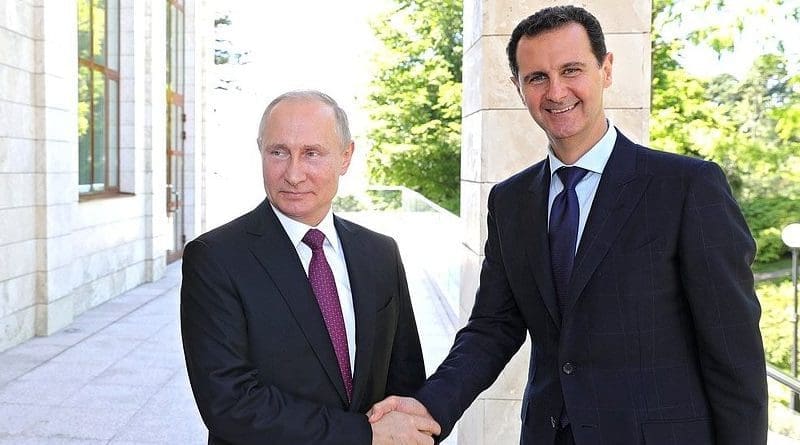Assad Duped By Russian Masters Over Abkhazia And South Ossetia – OpEd
By Arab News
By Luke Coffey*
President Bashar Assad this week made the unexpected announcement that Syria would recognize the independence of Abkhazia and South Ossetia — two regions in the South Caucasus that are internationally recognized as being part of Georgia but have been under Russian occupation since 2008. Collectively, these two regions account for 20 percent of Georgia’s territory.
The timing of this announcement is probably not a coincidence. This year marks the 10th anniversary of Russia’s invasion of Georgia and the recognition of South Ossetia and Abkhazia’s independence that soon followed. Since then, Russia has tried, and largely failed, to garner international support for the two occupied regions. So far, only Nicaragua, Venezuela, Nauru and now Syria have joined Moscow in recognizing their independence.
Both South Ossetia and Abkhazia have become important pawns in Russia’s geopolitical machinations in the South Caucasus. Ten years after the war, Russia is still in direct violation of the Six-Point Ceasefire Agreement by not allowing humanitarian aid or international observers into the two regions.
Over the past decade, both regions have also become large Russian military bases. Thousands of Russian troops and hundreds of tanks, armored vehicles and artillery pieces are stationed in South Ossetia and Abkhazia, allowing Moscow to exert great influence in the region. The Kremlin is also keenly aware that major oil and gas pipelines, as well as the primary east-west motorway and rail line, pass nearby.
On top of Russia’s militarization of the two regions, it has spent millions of dollars building fences around the administrative boundary between occupied South Ossetia and Abkhazia and the rest of Georgia. In some cases, these fences cut villages, families and farms in half.
While Assad’s announcement about South Ossetia and Abkhazia came unexpectedly for many, there are three notable points that stand out and tell us a lot about the relationship between Syria and Russia. First, notwithstanding Assad’s dependency on Russia, it seems odd that he would support secessionist movements of breakaway regions in other countries. Syria is a deeply fractured country and, after more than seven years of civil war, it is also a de facto partitioned country. Certain groups, like the Syrian Kurds in the northeast of the country, are clamoring for international support and recognition for independence. It is in this context that Assad’s new stance on Abkhazia and South Ossetia seems odd and, in the words of the US State Department, “ill-advised.” Considering this, the decision by Assad shows how much influence Moscow really has on him and his regime.
Secondly, Syria’s announcement illustrates how Russia connects many of its smaller geostrategic challenges around the world into a bigger picture. In this specific case, Moscow has used Damascus to link the civil war in Syria with Russia’s objectives in the South Caucasus. The Kremlin sees issues like competition in the Arctic, the war in Ukraine, the annexation of Crimea, influence in the South Caucasus, intimidation of the Baltic states, meddling in the Balkans, and its role in Syria as all being interconnected. All of these geopolitical challenges are simply pieces in a larger grand strategy pursued by Moscow to maximize Russian influence. This is unlike the West, which sees all of these geopolitical issues individually. In a nutshell, Russia is playing chess and the West is playing checkers.
Thirdly, Syria’s announcement has a whiff of Russian desperation. Soon after the war in 2008, Russia unilaterally recognized the independence of the two occupied regions. Since then, Russia has led an international drive for recognition of the two so-called republics that has been a dismal failure. Out of 193 countries in the UN, only five recognize the independence of these illegitimate republics.
Far from being independent, in reality both regions have puppet governments, which depend wholly on Moscow for their economic survival. All the while, Georgia has not let the occupation of these two regions stop it from making good progress in getting closer to NATO and the EU, which Moscow despises.
It is extraordinary to think that, with everything going on in Syria, Russia convinced Assad that what little political capital he had remaining on the international stage was best used by recognizing South Ossetia and Abkhazia as independent states. Since Assad is so dependent on Moscow for the survival of his regime, it is clear he will do just about anything to please his Kremlin masters.
For its part, Georgia’s response has been swift and predictable. Tbilisi has cut diplomatic relations with Damascus. The Foreign Ministry released a statement saying that Syria’s recognition of South Ossetia and Abkhazia as independent states was an “illegal decision and in violation of the fundamental norms and principles of international law” and that the decision “was as a result of the manipulation from the Russian Federation.” Ultimately, Syria was duped by Russia.
In a peculiar way, Assad’s announcement has now exported the conflict in Syria to Georgia. In the bigger picture of Assad’s atrocities, recognizing the independence of two Russian-occupied regions in Georgia ranks low. Just another item to add to the swelling list of human rights abuses carried out by Syria and its master Russia.
*Luke Coffey is director of the Douglas and Sarah Allison Center for Foreign Policy at the Heritage Foundation. Twitter: @LukeDCoffey

